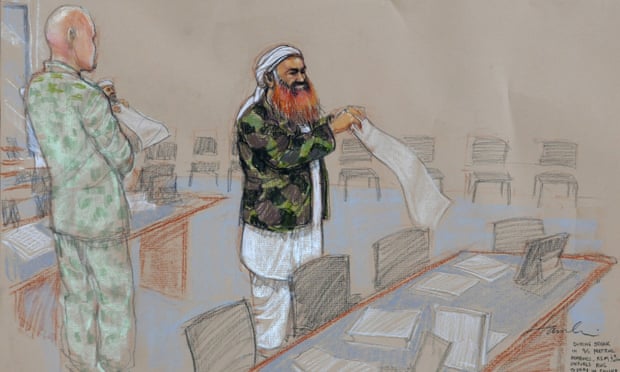9/11 judge and prosecutors should step down over 'destroyed evidence', defense demands
Move throws case against Khalid Sheikh Mohammed into chaos as defense team says ‘fatally flawed’ Guantánamo military tribunal should be ended An explosive allegation about destroyed evidence threatens to unravel the already shaky military tribunal for the alleged architect of the 9/11 terrorist attacks
An explosive allegation about destroyed evidence threatens to unravel the already shaky military tribunal for the alleged architect of the 9/11 terrorist attacksAttorneys for Khalid Sheikh Mohammed are calling on the judge and the entire prosecution team in Mohammed’s military commission at Guantánamo Bay to step down from the long-running case over what a member of the defense team called “at least the appearance of collusion” that led to the government apparently secretly destroying information relevant to the premier post-9/11 tribunal.
The defense team further argues that the destruction of evidence ought to spell the end of Mohammed’s military trial entirely, a development that would leave the Obama administration and its successor to come up with an entirely new plan for what to do with the top terror suspect in US custody.
“Now, and indeed over other matters previously, Khalid Sheikh Mohammed’s military commission is fatally flawed,” said David Nevin, Mohammed’s lead attorney.
The prosecution in the 9/11 military tribunal is seeking the death penalty for the self-described architect of the attacks, who has been in US custody for more than 12 years.
The details of what happened are not known because the unclassified legal filing is not yet publicly available. The specific allegations were filed yesterday before the commission, but the filing must clear a routine security review that all such legal documents before the commission undergo.
Marine Corps Maj Derek Poteet, another member of Mohammed’s defense team, said that the move to call for the removal of the judge, Army Col James Pohl, and the prosecution team headed by Army Brig Gen Mark Martins is “something you do not do lightly”.
Poteet said: “I have great respect for Colonel Pohl and Brigadier General Martins, and accordingly I am disappointed, disturbed and sad that we found it necessary to file this motion.”
Martins, a widely respected officer whose final military service will be presiding over the military commissions, told the Guardian that he would not comment on an issue before the tribunal.
Cmdr Gary Ross, the Pentagon’s spokesman for detentions and military commissions, said “it would be inappropriate to comment on a document not yet released to the public”.
Poteet said the rules around discussing classified or protected information limited his ability to describe the case. As he spoke with the Guardian, his defense department-appointed security officer was on the call to advise him about his answers. Nevin also said he was restricted from discussing the matter beyond its vaguest outlines.
But Poteet said that roughly two years ago, the prosecution in the tribunal relayed a request by the US government to destroy evidence relevant to both the guilt phase and the sentencing phase of Mohammed’s trial. Pohl issued an order instructing the government not to destroy the evidence, pending a further order. Attorneys for Mohammed did not take further legal action, as they considered the matter settled.
But around late December 2015, the defense team received what the lead attorney Nevin called a “hint from the prosecution that the evidence was no longer available to us”.
On 10 February, the defense team received a sealed order from Pohl revealing that 20 months earlier, the judge had permitted the government to destroy the evidence.
Poteet said that had the defense team been alerted to Pohl’s reversal of his evidence-destruction order, it would have attempted to stop it.
“There’s at least the appearance of collusion between the prosecution and the judge. We’re not saying more than that, but there is that appearance,” Poteet said.
Mohammed has been in US custody since 2003. CIA operatives waterboarded him 183 times in a single month early in his detention. Earlier attempts at both military tribunals and federal criminal trials for him and his co-defendants have both failed. Congress has passed a law preventing the Pentagon from transferring Guantánamo detainees to the US, for trial or other imprisonment. The second military tribunal of Mohammed and his co-defendants has lasted four years without yet reaching the trial phase.
Nevin and Poteet said that they were ultimately seeking the end of Mohammed’s military commission, even if Pohl recuses himself in favor of a different available military judge and a new prosecution is appointed. “The effect is there would be no further prosecution,” Nevin said.
Even if the defense team’s motion fails and Mohammed is ultimately found guilty, Poteet said Mohammed’s attorneys were likely to bring up the evidence destruction issue at sentencing, another indicator of how protracted a legal resolution of the 9/11 attacks has become.
The government must respond to the motion within 14 days. Underscoring the uncertainty of the situation, the next pre-trial hearing in the case is slated for the end of May, but Pohl may not take up the question of whether he should recuse himself and the prosecution from the case, as several other outstanding issues are already on the commission’s agenda.
James Connell, an attorney for Mohammed’s co-defendant Ammar al-Baluchi, said that among the 9/11 defense teams, “there’s a difference of opinion as to whose fault” the destruction of evidence is. Connell said he was “considering my options” on calling for Pohl’s removal.
“At the very least, the prosecution team manipulated the system that resulted in the destruction of evidence,” Connell told the Guardian.
Asked if the evidence destruction had moved the already turbulent 9/11 military tribunal into uncharted territory, Nevin said: “We’ve been in uncharted territory for a long time. And this is another instance of it.”
http://www.theguardian.com/us-news/2016 ... d-evidence 




